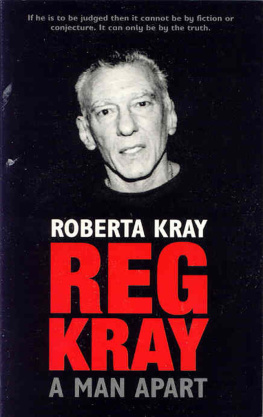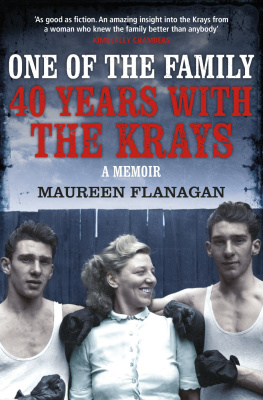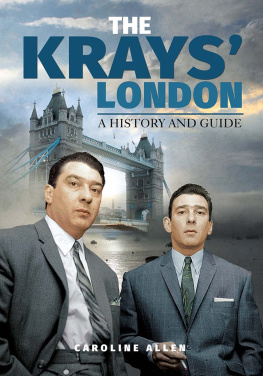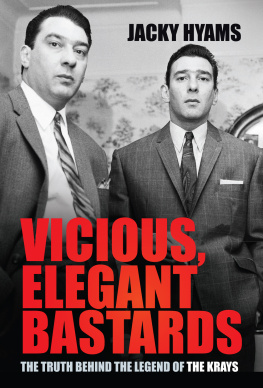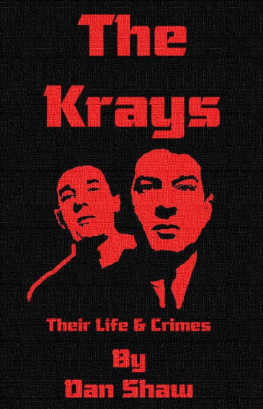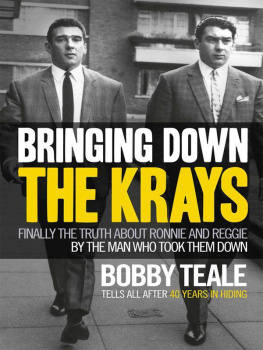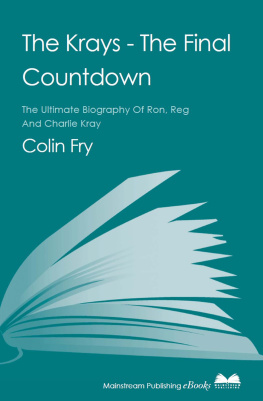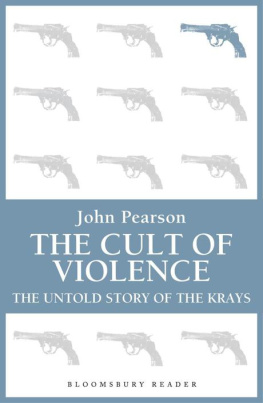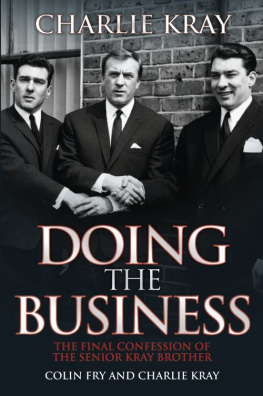Table of Contents
Reggie Kray's East End Stories
REGGIE KRAY
Hachette Digital
www.littlebrown.co.uk
Published by Hachette Digital 2010
Copyright Reggie Kray and Peter Gerrard Maps and family tree John Gilkes
The moral right of the author has been asserted.
All rights reserved.
No part of this publication may be reproduced, stored in a retrieval system, or transmitted, in any form or by any means, without the prior permission in writing of the publisher, nor be otherwise circulated in any form of binding or cover other than that in which it is published and without a similar condition including this condition being imposed on the subsequent purchaser.
A CIP catalogue record for this book is available from the British Library.
eISBN : 978 0 7481 1198 5
This ebook produced by JOUVE, FRANCE
Hachette Digital
An imprint of
Little, Brown Book Group
100 Victoria Embankment
London EC4Y 0DY
An Hachette Livre UK Company
Kray Family Tree
Foreword
Roberta Kray
I first made Reg Krays acquaintance on a cold March day in 1996. That we ever met at all was purely down to chance. A friend of mine whod promised to help out with the publicity for a video being made about Regs late brother Ron, found himself with work commitments abroad and needed someone to take his place. Would I be interested?
During my long nervous wait in the visiting room at HMP Maidstone, being carefully scrutinised by a number of stern-looking prison officers, I had plenty of time to question the wisdom of ever having agreed to the proposition. I wondered what on earth I was doing there and what kind of a man I was about to encounter. I knew very little about the Krays, the only clues I did possess coming courtesy of a seemingly endless string of parodies that had appeared on TV in the 1980s. If these were to be believed, then Reginald Kray could well turn out to be a rather stupid strutting gangster, a man overly keen both to impress and intimidate. How wrong could I be?
As Reg emerged from the door at the back of the hall and quickly walked over to introduce himself, I found myself in the presence of a polite, grey-haired, softly spoken man. It would be wrong to claim that all my reservations instantly disappeared but they were, for the next couple of hours, put on hold. It was his energy and spirit that had the most profound effect on me. Reg Kray, against all the odds, proved himself to be a man of intelligence, determination and humour.
We were very different people, from completely different backgrounds, but through the following months our friendship gradually grew stronger. Prison isnt the easiest of places in which to openly express your emotions - any sign of weakness will be instantly exploited - and I quickly became aware that he found it easier to talk to someone who was outside the system. It is always flattering to be taken into someones confidence but over the following months it became clear that the bond between us was turning into something deeper.
Through our long conversations I realised that Reg was trying to deal with a number of difficult emotions: grief at the loss of his twin brother; an intense desire to make the most of the present; and a growing frustration at his own uncertain future. It was at difficult periods like these that he looked most often to the past.
Reg had many regrets about his life. He was aware that he had made disastrous decisions, taken wrong roads and done too much damage through the choices he had made. However, there was one thing he always remained proud of and that was his roots in the East End of London. It was to these streets, and the characters which had once peopled them, that - in his mind at least - he could always return. It was these memories that gave him solace and helped him through the darkest hours.
This book is Regs very personal journey through the place he held most dear. It is a story he started writing many years ago, but to do justice to the people he had known, the people who had shaped him, seemed an almost impossible task. However, he always wanted it to be read. It is now ten years since his death, a fitting time perhaps to reveal a little more about the man behind the public image. Within the pages of this book can be found clues as to what motivated Reg and his twin brother and why they grew up to become two of Britains most infamous villains. The East End of their childhood, with its tight-knit community and strong, often eccentric characters, was to have an enduring influence.
Regs grandparents, all of them born around the 1870s, lived in an East End renowned for its poverty and squalor. Vastly over-populated, lawless and disease-ridden, this part of the capital was notorious, and by the 1880s had become known as a place of darkness, of terrible violence, depravity and horror. For the rest of London, this vision was confirmed by the brutal killing spree of Jack the Ripper in 1888. To survive in such an environment took guts, determination and a modicum of luck.
Both of Regs male grandparents, Jimmy Kray and John Cannonball Lee, were powerful, fighting men. Whether in the boxing ring or on the street, this ability served two useful purposes: they were able to supplement their meagre incomes and could also gain the respect of others. To make a name for yourself - by whatever means - meant that you stood out from the crowd. In the heaving amorphous mass of the East End, this was no small achievement, and this legacy, this burning determination to be someone, was duly passed on to their grandsons.
It was the deep-rooted desire not just for fortune but also for fame that undoubtedly contributed to the downfall of the Krays. While other criminals would sensibly keep their heads down, never drawing unwanted attention to themselves, the twins were the very opposite. Being successful was not enough - they needed to be seen to be successful. As such, they frequently courted publicity, mixing with movie stars, politicians and sportsmen, and even going to the extreme of engaging a biographer to write their life story shortly before their arrest. However, while Reg was growing up in the 1930s, all this was a barely imaginable future. Times were tough and with few opportunities to escape from the grinding poverty many young boys like him looked to the famous local boxers, the street fighters and the prosperous villains as examples of how to succeed. Even at a tender age, it must have been clear to Reg that crime could pay. To make a good living, you either had to be smart or you had to be tough. But better if you could be both.
Reg was very aware of the hardships his close relatives had endured. They were part of an East End population that felt itself abandoned by the government and, as such, owed little in return. Regs father, Charles Kray, found himself on the wrong side of the law when he deserted the army, reluctant to serve a country that had shown an utter disregard for the welfare of his grandparents, his parents or his own wife and kids.
Of course it was not just the men of the East End who had a lasting influence on Reg, but the women too. If there was one thing that could always make him smile, it was reminiscing about his mother. One of three feisty sisters, Violet Kray understood what it took to survive and fought a constant battle to keep her children safe and healthy. With her husband often absent, it was left to her to raise her sons and often provide for them too. Reg once told me that one of his most enduring memories was of his mother pawning her wedding ring to put food on the table. Such sacrifices had a profound effect on him.




